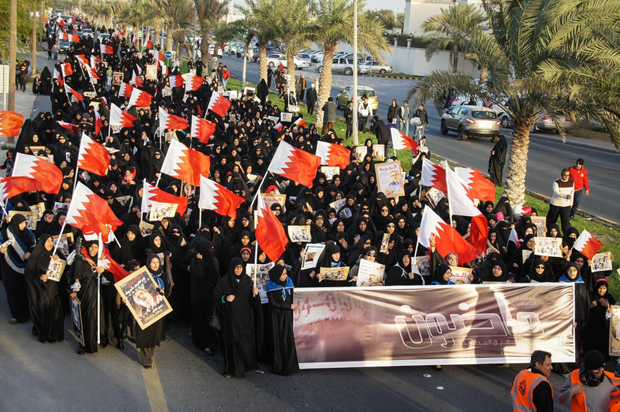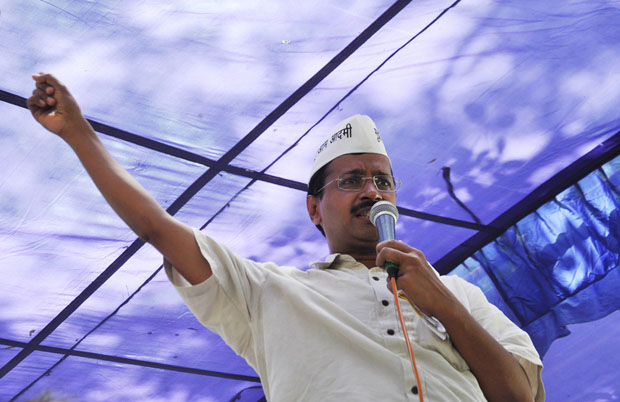21 Jan 2014 | Middle East and North Africa, News

A pro-democracy protest in Bahrain, where activists have been jailed for inciting protests through their online activities (Photo: Moh’d Saeed / Demotix)
One hundred and forty characters are all it takes.
Twitter users from Marrakech to Manama know—call for political reforms, joke about a sensitive topic, or expose government abuse and you could end up in jail. Following the overthrow of Muammar Qaddafi and Zine el-Abidine Ben Ali, authorities in Libya and Tunisia unblocked hundreds of websites and dismantled the state surveillance apparatus. But overall, internet freedom in the region has only declined in the three years since the Arab Spring as authoritarian leaders continue to crack down on any and all threats to their ever-tenuous legitimacy.
As the online world has become a fundamental part of Arab and Iranian societies, leaders are waking up to the “dangers” of social media and placing new restrictions on what can be read or posted online. This shift has been most marked in Bahrain, one of the most digitally-connected countries in the world. After a grassroots opposition group took to the streets to demand democratic reforms, authorities detained dozens of users for Twitter and Facebook posts deemed sympathetic to the cause. Similarly, several prominent activists were jailed on charges of inciting protests, belonging to a terrorist organization, or plotting to overthrow the government through their online activities.
Conditions in Egypt—where social media played a fundamental role in mobilising protesters and documenting police brutality—continued to decline over the past year. In only the first six months of Mohammad Morsi’s term, more citizens were prosecuted for “insulting the office of the president” than under Hosni Mubarak’s entire 30-year reign. Cases have now been brought against the same bloggers and activists that were instrumental in rallying the masses to protest against Mubarak (and later Morsi) in Tahrir Square, while countless others were tortured by Muslim Brotherhood thugs or state security forces.
Even in the moderate kingdoms of Morocco and Jordan, state officials are looking to extend their existing controls over newspapers and TV channels to the sphere of online media. Ali Anouzla, a website editor in Morocco, faces terrorism charges in the latest attempt by the state to silence him and his popular online newspaper, Lakome. Access to independent journalism is even worse in Jordan, where over 200 news sites have been blocked for failing to obtain a press license. The government instituted burdensome requirements in a bid to deter any views that counter the state-sponsored narrative.
If governments are beginning to pay attention, it is because online tools for social mobilisation and individual expression are having a profound impact. Social media accounts were set up for every candidate in Iran’s 2013 presidential elections, despite the fact that Twitter, Facebook, and YouTube are all blocked within the country. In Saudi Arabia – which now boasts the highest Twitter and YouTube usage per capita of any country in the world – social media has been used to promote campaigns for women’s right to drive, to highlight the mistreatment of migrant workers, and to debate sensitive subjects such as child molestation. Citizen journalism was vital in documenting chemical weapons use in Syria, and a new online platform alerts local residents of incoming scud missiles. Nonetheless, Iran, Saudi Arabia, and Syria rank as some of the least free countries in the world in terms of internet freedom according to Freedom House’s Freedom on the Net study.
Remarkably, the country that has made the most positive strides over the past three years, was once among the most repressive online environments in the region – Tunisia. Protest videos from the town of Sidi Bouzid led to an intense crackdown on online dissidents by the Ben Ali regime. Digital activists even enlisted the help of Anonymous, the hacktivist group, to rally international media attention, provide digital security tools, and bring down government websites. Since then, Tunisian authorities have ceased internet censorship, reformed the regulatory environment, and ceded control of the state-owned internet backbone. Tunisia is now the only country in the region to have joined intergovernmental group the Freedom Online Coalition.
So while the snowball effect of social media contributed to the overthrow of several despots, many of the region’s internet users conversely find themselves in more restrictive online environments than in January 2011. Authoritarian governments now know exactly what the face of revolution looks like and, over the past three years, have shown their commitment to counter the internet’s potential to empower citizens and mobilise opposition. Users in liberal democracies may joke about the insignificance of “liking” a post on Facebook or uploading a video to YouTube, but in a region where your social media activity can make you an enemy of the state, 140 characters can lead to serious repercussions.
This article was posted on 21 January 2014 at indexoncensorship.org
20 Jan 2014 | Middle East and North Africa, News, Palestine

The logo of the Al Qassam Brigade, the armed wing of Hamas
Last week, Hamas’ militant wing the Iz Al Din al Qassam Brigades announced via their website that their primary English-language Twitter account, @alqassamBrigade had been suspended. The group said : “The Qassam Brigades confirmed that they did not violate Twitter’s terms of service ever … Twitter still not sending Al Qassam any justifications for the suspension.”
When asked by Index why the account was suspended, a spokesperson from Twitter responded: “”We do not comment on individual accounts, for privacy and security reasons.”
Twitter’s decision to suspend the account becomes evermore confusing beyond this first glance. If the goal is to prevent Al Qassam from using Twitter, it’s ineffective, as their secondary English-language account as well as a primary Arabic account are both still active- not to mention the ease with which a new account can be created. It’s difficult to see what closing the account achieved other than giving a group that, by definition feeds off exclusion from the mainstream, fuel for pariah status.
Moreover, the timing of the decision appears to be somewhat out of the blue. If Twitter was truly concerned about inflammatory remarks, then they would have suspended the account back in November 2012, when Al Qassam and the Israeli Defence Force used Twitter to bait one another during the last Gaza war. This period set a new bar in terms of direct and hostile communication via Twitter, not just between Al Qassam and the IDF but also by their supporters. Objectionable though some of it may have been, Twitter never interfered with the fray.
Nonetheless, this particular corner of the Internet is constantly caught between the need that websites such as Twitter act as a transmitter of free speech, and the extreme pressure that it is subjected to by interest groups. On the 20 November 2012, “Christians for a United Israel” filed a petition with Twitter to close Al Qassam’s account, on the grounds that it counted as “material support” for an internationally recognised terrorist group, Hamas.
But as David Cole pointed out in a piece for the Daily Beast’s Open Zion blog at the time, the terms of what constitutes this “material support” are so broad as to be almost meaningless – and Gaza is filled with so many international products that it could be argued that Coca Cola, ExxonMobil and a large number of Israeli products that are regularly exported to Gaza are also supporting Gaza’s ruling Hamas party. Twitter is simply a conduit – as Cole points out, “Twitter is for all practical purposes a ‘common carrier’, providing its service to all comers. Would we hold a telephone company responsible for allowing a gang to use its phone lines to plan a crime, or the Postal Service responsible for delivering a package of drugs?”
The other curious element about this timing is that the suspension comes at a time when jihadist accounts are proliferating on Twitter, in Arabic and in English. Jihadist individuals and groups within Syria have increasingly taken to social media as a way to spread a message about their beliefs and intentions as part of Syria’s civil war. Individual members of Jabhat Al Nusra and increasingly ISIS have used Twitter as a means of provoking one another off the battlefield. While this may not be the official accounts of each group tweeting, it is not so different in content from anything that Al Qassam have tweeted recently. If Twitter were truly concerned about the content of Al Qassam’s account, then they would have been forced to close far more than just the one.
Terrorist groups using different forms of media to transmit their message to a wider public is nothing new. Complaining that Twitter helps terrorists talk to the public sounds as outdated as complaining that Al Jazeera broadcasted statements by Osama bin Laden: in this sense, the medium is not the message.
To consider the alternative for a moment: Gaza is not a haven for free media. Journalists of any nationality that operate on the ground there do so under heavy restrictions from a variety of parties. Beyond the day to day restrictions on their movement, speech and work, talking directly to the Al Qassam Brigades is almost impossible. Social media, while potentially a tool for propaganda, is one of the few ways that the wider public is able to know what is happening inside Al Qassam Brigades and Hamas. Cutting off this line further maligns part of a regime that uses this seclusion to its political advantage within Gaza, and allows Hamas to further clamp down on free speech within the Strip. In short: the content may be a strange development on Twitter, but its absence potentially has tangible effects for people on the ground.
This article was posted on 20 January 2014 at indexoncensorship.org
15 Jan 2014 | China, Digital Freedom, News, Politics and Society

Despite state censorship and political repression, social media is changing the protest landscape in China.
With the exception of economic reform that started in the late 1970’s, the country has remained restricted by government policy and ideology. A one party state has led to a national media that lacks plurality and regularly fails to report on incidents that they fear may damage the government’s image. Combined with internet censoring and heavy-handed tactics being employed against state opposition, freedom of expression has always been limited, but there is hope for change.
Social media within China has expanded rapidly, Sina Weibo — 60 million active daily users, 600 million registered users (Sep 2013) — and WeChat — 300 million registered users, of which 100 million are international (Aug 2013) — are two of the most popular. This allows a democratic spread of information that has never previously been available to citizen journalists or local people.
A media project by the University of Hong Kong showed the importance of Weibo in relation to the 2012 protest in Shifang against potential environmental damage by a proposed copper plant. Traditional media largely declined to report on the protests themselves, but made reference to ‘an incident’ and the rising stock price of a tear gas company, whose product was used on protestors. In contrast, there were around 5.25 million posts on Weibo containing the term ‘Shifang’ between 1-4 July with 400,000 containing images and 10,000 containing video. A similar incident occurred in Chengdu, Sichuan province, when factory workers went on strike to demand higher wages. State media ignored the protests while social media spread the news that tear gas was being used, along with images of the protest. Eventually officials stepped down and workers received a raise. Physical protests can be complemented by online activity, but it is not without difficulties.
In addition to the notorious firewall, the government can censor specific words to try and control the narrative of any given incident, by pushing their own agenda and restricting citizens’ freedom of expression. However, many online users use images, and memes in particular can portray a serious topic in a light-hearted manner, further increasing the spread of information.
An OECD report in 2013 evaluated government trust in various countries, China ranked very well with 66% compared to an OECD country average of 40%. However, this disguises some of the ill-feeling towards local government officials, who are usually held accountable by the people. This could change though, as economic policy, typically the role of central government, leads to growing inequality. New leadership within the government is attempting to maintain and improve government trust, by introducing ‘Mao-esque’ techniques in an attempt to bring everyone together under one nation.
It is clear that censorship is one way of trying to achieve this, as those who openly promote citizens’ rights, inclusive democracy and transparency are regularly arrested, including Xu Zhiyong. Additionally, new training materials for journalists and editors suggest a government eager to maintain control, as they expect that the media “must be loyal to the party, adhere to the party’s leadership and make the principle of loyalty to the party the principle of journalistic profession.”
Recently, a planned protest to honour a strike over censorship last year was pre-emptively halted, when police warned or detained several people thought to be involved. A well-known campaigner for freedom of expression, Wu Wei, said that protests such as this were not accepted by the government, as they did not fit “within their social stability framework.”
The government is so concerned over social instability that Tiananmen Square is heavily monitored by uniformed and plain-clothed police. The ability to suppress dissent as quickly as possible is necessary in a popular tourist destination, to portray the image of a peaceful China to both international and domestic visitors. The digital censorship employed the government is reflected in physical terms by the large security presence in one of China’s most well-known but contentious landmarks.
The Chinese government is keen to have control over the nation’s information, and fear that freedom of expression and information could pose a threat to their power. Social media offers a critical viewpoint that is lacking from state-controlled media. However, even social media has not been able to completely detach itself from the Chinese government’s censorship.
Nonetheless, the increasing use of social media and rapid spread of information is putting pressure on the government that it has never felt before while the digital revolution is gaining more and more momentum. Democratic consciousness is rising in China and with the state pursuing an oppressive agenda, cultural change from the bottom-up, rather than institutionalised change from the top-down, is necessary to pursue these principles.
This article was posted on 15 Jan 2014 at indexoncensorship.org
6 Jan 2014 | Digital Freedom, India, News, Politics and Society

Social media played a significant part in Arvind Kerjiwal’s successful campaign to become chief minister of New Dehli. He is pictured here addressing auto drivers at a protest in June last year (Image: Rohit Gautam/Demotix)
Much has been written about the influence of social media in the upcoming Indian national elections, expected to take place in mid 2014.
While the two major political parties, the Congress and BJP, have invested in social media cells, the larger consensus is that the internet is still largely an urban phenomenon, and therefore, somehow, not important. According to the latest TRAI figures, rural tele-density still stands at 42%. However, the flip side is that urban tele-density, currently at 144.28%, has allowed the cities to become a litmus test of what could happen if the population was able to access the internet, therefore social media, during election time.
Against the backdrop of social media giving the average citizen a voice to express often ignored opinions, came the anti-corruption protests of 2011, led by Gandhian Anna Hazare and his commander-in-chief, former bureaucrat Arvind Kejriwal. As the two spearheaded a campaign to fight against the injustices meted out to the common man through an oppressive political system, and fought for an anti-corruption law to be passed, they found an onslaught of support over social media by the middle class. Even the TV news channels got caught up in the noble theatrics, keeping the cameras live at Anna Hazare’s hunger strike in the capital, attracting more viewers, and also more supporters for their cause.
Two years later, the bill has been passed – but Team Anna, as it was popularly called, split into two factions The first remains under the leadership of Anna Hazare, and has dissipated into the background. The second, however, has only grown in size and stature. Arvind Kejriwal, in perhaps the most maverick of moves, sits in the capital of India today as its chief minister. This, with a groundswell of support not just from the haggard residents of New Delhi, but seemingly growing support from all over the country. Many factors have contributed to this rise; however, one can certainly identify the role of social and citizen media in shaping this particular election, especially when it comes to Delhi’s middle class.
Kejriwal formally formed the Aam Aadmi Party in November 2012, which translated means the ‘Common Man Party’. They decided to contest the 2013 Delhi elections, with Kejriwal directly taking on three time Congress Chief Minister, Sheila Dixshit, in her constituency. He defeated her.
The Aam Aadmi Party today has 1, 137, 873 likes on Facebook. People can donate to the party online, and follow its leaders on Twitter. What’s more, in a clear and concise website, AAP lists out its manifesto, explanations about its constitution and decisions and even an internal complaints committee. It has a video link, a blog, and even an events page so that people can join in. As it gears up for the 2014 national elections, AAP is also inviting nominations for candidates online. This is unheard of in Indian politics, where politicians are born out of birthright or bribes.
As elections in Delhi were underway, Indian media reported that Kejriwal had admitted to learning from Barack Obama’s social media strategy of 2008, which many believe helped him win the White House. Seven thousand dedicated volunteers consisting of students, workers, people on sabbatical from their jobs, and even retired government officials joined to help AAP rise to power. They collected roughly $1.8 million USD for the campaign in 2013. After the campaign was over, analysts revealed the success of AAP with first time voters: AAP’s online coordinators talk of reaching 3.5 million people just before voting day with an app called Thunderclap, which sits on your Facebook page and tells you to go vote. There seemed to be some sort of social media pressure to be trendy and go vote when it came to the youth of Delhi. However, when it came to its low-income group supporters, AAP did not rely on the power of social media, but implemented a door-to-door strategy which would work in that demographic.
AAP has not been without its share of controversies, the most recent of which was deftly handled through opinion polling over telephone and social media. Kejriwal had announced that in the cause of a hung election in Delhi, his party would absolutely not take the support of either the BJP or Congress to form government. The situation played out exactly as they hoped it wouldn’t. So as to not go back on his word, but still have the option of forming government, AAP decided to ask the people what to do. Suddenly, the people of Delhi could vote in various ways, advising Kejriwal on what he should do. After the polls closed, Kejriwal declared that overwhelmingly, AAP supporters wanted him to form government, which he did. As expected, the BJP has alleged that the “so-called referendum” was actually members of the Congress Party spamming the poll to ensure AAP took Congress support to form government, thereby letting the defeated Congress government regain a position of power.
The takeaway from Kejriwal’s success is that social media buzz, leading to (or perhaps caused by) the mainstream media coverage, has effectively resulted in a small time activist now sharing prime time space with Prime Ministerial candidates like the Congress’s scion Rahul Gandhi and the BJP’s Narendra Modi. In the virtual world, the scales are shifting. The Times of India reports that television channels and social media immediately latched on to AAP leader Arvind Kejriwal as the new ‘hero’ who has since then been eating into Modi’s turf – that of the ‘public mind space’. In this war for public attention, Kejriwal seems to be gaining ground at Modi’s cost.
The Aam Aadmi Party and Arvind Kejriwal have certainly cornered the market on becoming heroes for promises made, aided by a masterful communication strategy. But there is more to this. Indians – residents of New Delhi – finally were able to participate in the interactive social media political campaign that they had previously only read about. The promise of an active democracy where the political leaders don’t just dictate terms but actually solicit and respond to the common man is too tempting an offer to ignore. In his first few days in office, Delhi’s new chief minister was unable to come in to the office, and almost comically tweeted that he was held back because of “loose motions.” The joke goes that perhaps some filters are necessary on social media!
However, irrespective of whether AAP delivers on all its promises or is somehow muscled out of office in a few months, it has proven something to all Indian media watchers. Social media buzz has helped in shaping the agenda for India’s largest and most important city, making a newly formed political party into a serious player in just over a year. This is significant as India has over 360 political parties, and space is limited on the national stage. With a few months to go until the national elections, one can expect more articles in the newspapers, listing out how other politicians have suddenly found the value of interacting with the common man over Facebook and Twitter, helpfully answering questions and taking feedback.
This article was p0sted on 6 Jan 2013 at indexoncensorship.org




